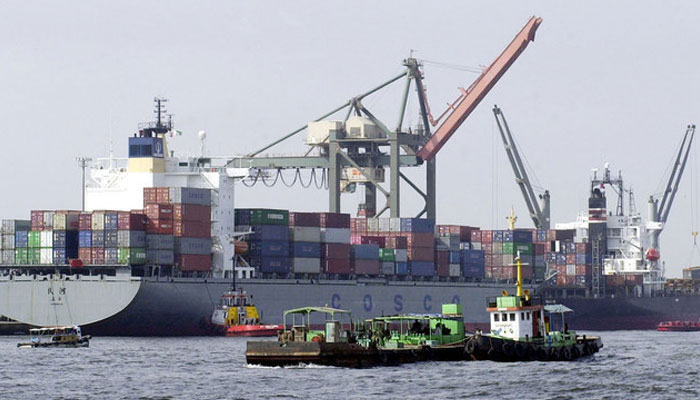Govt launches comprehensive ports’ digitisation plan
These initiatives are set to transform country’s ports into state-of-the-art hubs for international trade
ISLAMABAD: In a significant move to modernise its maritime sector, Pakistan has launched a series of digital reforms aimed at enhancing efficiency, transparency, and economic growth.
Spearheaded by the Task Force (TF) on Revamping of Pakistan’s Maritime Sector, these initiatives are set to transform the country’s ports into state-of-the-art hubs for international trade.
Defence Ministry sources said that Pakistan’s maritime sector, anchored by key ports such as Karachi, Port Qasim, and Gwadar, plays a pivotal role in the nation’s economy. However, inefficiencies in port operations, outdated logistics systems, and a lack of transparency have long hindered its potential. Recognising these challenges, the TF has prioritised digitisation as a cornerstone of its strategy to revitalise the sector.
The following are the key initiatives driving the digital transformation:
Port Community System (PCS): A neutral electronic platform, the PCS, is being developed to facilitate secure information exchange among stakeholders. The system will be rolled out in three phases: 1. Focuses on vessel management, vessel calls, and integration of stakeholders. 2. Enhances vessel operations and integrates external systems. 3. Expands services to terminal gate management, logistics appointment systems, and information exchange services.
Revamping of WeBOC (Web-Based One Customs):
Pakistan Customs is upgrading its WeBOC system to improve efficiency and user experience. The revamp project includes service identification, UI/UX (user interface/user experience) enhancements, API (Application Programming Interface) integration, and rigorous testing of new features.
Real-Time Integration of Terminal Operating Systems (TOS):
To ensure seamless coordination, all TOS will be integrated in real-time with the PCS and WeBOC. This integration is expected to improve cargo handling, reduce delays, and boost overall port efficiency.
Digitisation of Financial Transactions:
All trade-related financial transactions will now be conducted digitally through the Pakistan Single Window (PSW), enhancing transparency and reducing corruption.
Vessel Traffic Management System (VTMS):
Ports are required to deploy 9 core operations of vessel traffic management to monitor vessel traffic, enhance safety, and improve coordination within Pakistan’s waters.
Establishment of OGAs (Other Government Agencies) Offices:
Dedicated office spaces will be provided for OGAs to facilitate faster clearance processes and better inter-agency coordination. All clearances will be in near real time.
Enterprise Resource Planning (ERP) Systems:
Karachi Port Trust (KPT) and Port Qasim Authority (PQA) are developing advanced ERP systems to automate workflows in six major areas and improve decision-making.
Business Intelligence (BI) Dashboards:
The PSW is creating BI dashboards to provide policymakers with real-time data analytics, enabling informed strategic decisions.
AI-Driven Risk Management:
The Risk Management System (RMS) and Integrated Risk Management System (IRMS) are being upgraded with AI and machine learning to automate risk assessment and streamline case processing.
Modernisation of Port Scanners:
High-tech scanners, such as Non-Intrusive Inspection (NII) Scanners, will be deployed to improve cargo inspection, enhance security, and reduce clearance times.
The sources term these reforms as a Vision for the Future. They said that these digital reforms mark a turning point for Pakistan’s maritime sector. By leveraging cutting-edge technologies, the country aims to modernise its trade infrastructure, attract foreign investment, and strengthen its position in global trade.
“The digital transformation of our maritime sector is not just about technology; it’s about creating a more efficient, transparent, and competitive economy,” said a source associated with the Task Force. “These initiatives will drive economic growth, create jobs, and improve the ease of doing business in Pakistan.”
As Pakistan moves forward with these ambitious reforms, the maritime sector is poised to become a key driver of national development, setting a new standard for efficiency and innovation in the region, claim the sources.
-
 King Charles Holds Emergency Meeting After Andrew Arrest: 'Abdication Is Not Happening'
King Charles Holds Emergency Meeting After Andrew Arrest: 'Abdication Is Not Happening' -
 Amazon Can Be Sued Over Sodium Nitrite Suicide Cases, US Court Rules
Amazon Can Be Sued Over Sodium Nitrite Suicide Cases, US Court Rules -
 'Vikings' Star Mourns Eric Dane's Death
'Vikings' Star Mourns Eric Dane's Death -
 Patrick Dempsey Reveals Eric Dane's Condition In Final Days Before Death
Patrick Dempsey Reveals Eric Dane's Condition In Final Days Before Death -
 'Heartbroken' Nina Dobrev Mourns Death Of Eric Dane: 'He'll Be Deeply Missed'
'Heartbroken' Nina Dobrev Mourns Death Of Eric Dane: 'He'll Be Deeply Missed' -
 Andrew Mountbatten-Windsor’s Arrest: What Happened When A Royal Was Last Tried?
Andrew Mountbatten-Windsor’s Arrest: What Happened When A Royal Was Last Tried? -
 Alyssa Milano Expresses Grief Over Death Of 'Charmed' Co-star Eric Dane
Alyssa Milano Expresses Grief Over Death Of 'Charmed' Co-star Eric Dane -
 Prince William, Kate Middleton Camp Reacts To Meghan's Friend Remarks On Harry 'secret Olive Branch'
Prince William, Kate Middleton Camp Reacts To Meghan's Friend Remarks On Harry 'secret Olive Branch' -
 Daniel Radcliffe Opens Up About 'The Wizard Of Oz' Offer
Daniel Radcliffe Opens Up About 'The Wizard Of Oz' Offer -
 Channing Tatum Reacts To UK's Action Against Andrew Mountbatten-Windsor
Channing Tatum Reacts To UK's Action Against Andrew Mountbatten-Windsor -
 Brooke Candy Announces Divorce From Kyle England After Seven Years Of Marriage
Brooke Candy Announces Divorce From Kyle England After Seven Years Of Marriage -
 Piers Morgan Makes Meaningful Plea To King Charles After Andrew Arrest
Piers Morgan Makes Meaningful Plea To King Charles After Andrew Arrest -
 Sir Elton John Details Struggle With Loss Of Vision: 'I Can't See'
Sir Elton John Details Struggle With Loss Of Vision: 'I Can't See' -
 Epstein Estate To Pay $35M To Victims In Major Class Action Settlement
Epstein Estate To Pay $35M To Victims In Major Class Action Settlement -
 Virginia Giuffre’s Brother Speaks Directly To King Charles In An Emotional Message About Andrew
Virginia Giuffre’s Brother Speaks Directly To King Charles In An Emotional Message About Andrew -
 Reddit Tests AI-powered Shopping Results In Search
Reddit Tests AI-powered Shopping Results In Search




